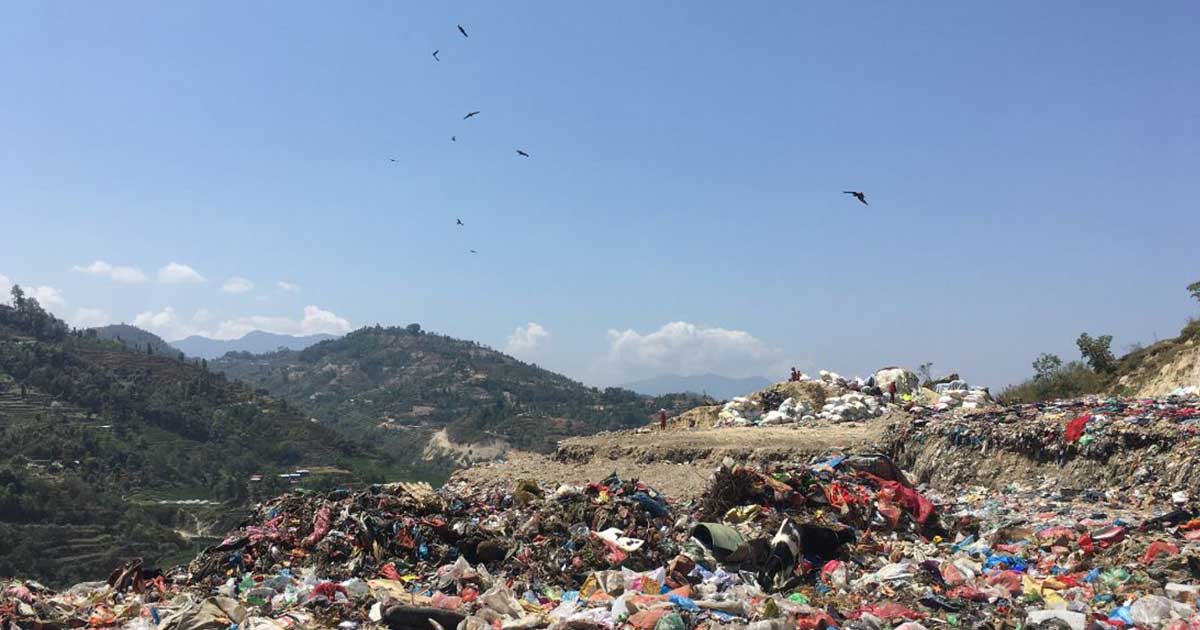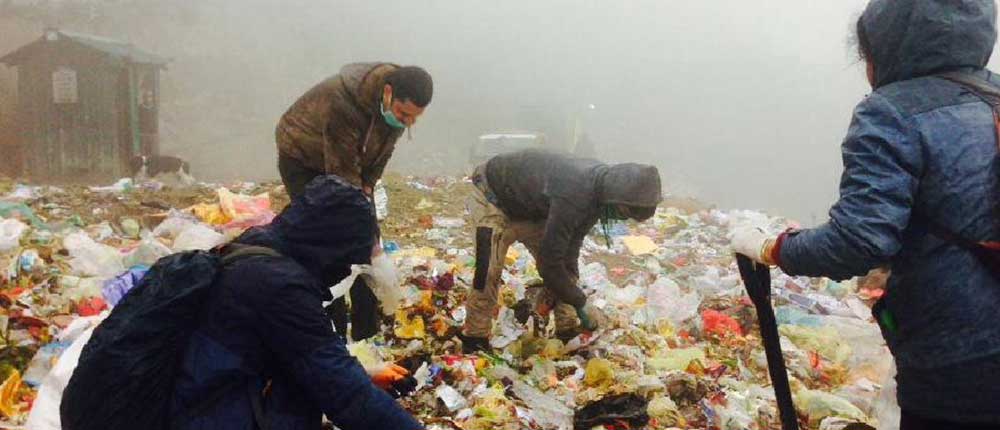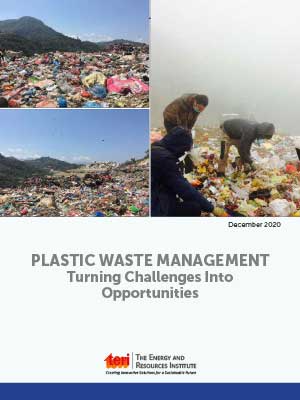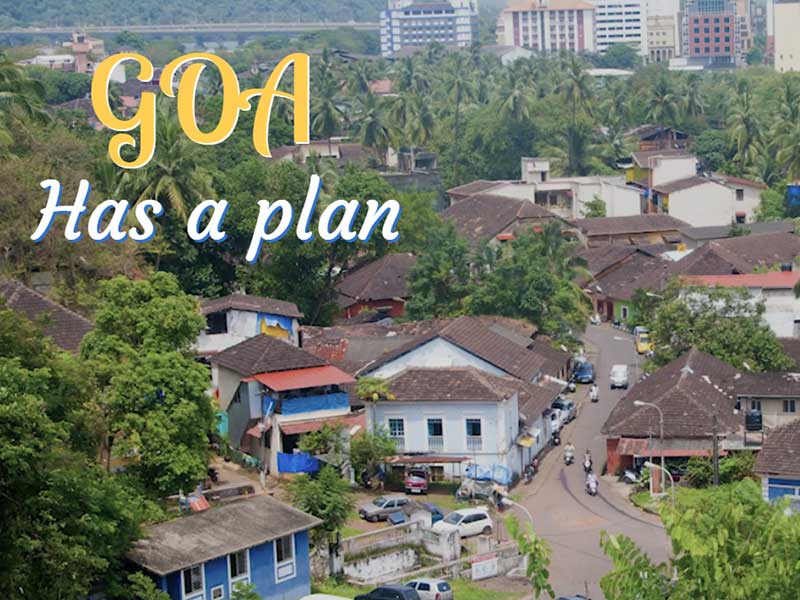Plastic Waste Management: Turning Challenges into Opportunities
Plastics not only are enduring, lightweight, and available at low prices, but also have very good thermal and electrical insulation properties. The versatile properties of various plastic polymers— being water-resistant, non-porous, ductile and malleable—make them suitable for manufacturing a wide range of products that also bring medical and technological advances in our modern society.

Statistics reveal that plastic production around the world has increased from 1.5 million tonnes per year as reported in 1950 to 359 million tonnes per year in 2018 (Garside 2019). About 40% of the global plastic is consumed by the packaging industry (Trade Promotion Council of India 2019). India consumed around 18.45 million tonnes of plastics in 2018–19 (PlastIndia, 2019).
One of the consequences of using excess plastics is the generation of plastic waste, especially through products that are of single-use. The Central Pollution Control Board (CPCB) estimated that in 2017, Indian cities generated about 9.47 million tonnes of plastic waste. This was because roughly 70% of the plastic packaging products are converted to waste in a short span of time (CPCB 2018, MoHUA2019). Plastic waste generation is expected to increase to 31.4 million tonnes by 2031 and further to 55 million tonnes by 2041 (Statista 2019), thus showcasing an urgent need to address the concerns from the growing plastic waste in our country.
The invention of plastics came as a blessing, but single-use plastics or those uneconomical for collection and recycling, in association with lack of awareness and poor solid waste management in cities, has resulted in its littering and finally reaching the marine environment from land-based sources. There are still challenges associated with the recycling of collected plastics, as well as environmental challenges associated with mismanaged plastics.

More than 60 countries have introduced ban or levies on single-use plastics like plastic bags and foamed plastic products (United Nations Environment Programme 2018). However, till date, no robust conclusions on the environmental impact of these bans and levies have been drawn. Experts believe that though the ban on single-use plastics could be an immediate solution to the problem, but will have a long-term degrading effect on the economy, particularly on the local plastic industry sector.
In India the regulations on Plastic waste management do exist but, proper implementation and monitoring of these rules are still not being done in many parts of the country, leading to the plastic waste littering problem. And to manage the mismanaged plastics, a number of challenges will have to be addressed. Possible solutions to manage plastics lies with alternate choices, strengthening waste management system and awareness, recognising the economic relevance of the plastic sector and strengthening reverse logistics.
This discussion paper brings forth a few recommendations to turn challenges into opportunities:
- Sustainable alternative choices based on the principle of 4Rs (Reduce, Reuse, Recycle, and Recover): Focus should be on implementing policies which help reduce waste from societies, like fewer and reusable packaging, buyback schemes to put back plastics into circular economy loops, and initiatives like agriculture residues as alternate packaging, that target reduction of stubble burning as well as plastics in the environment. We also need further research and development to develop products that have similar barrier properties and are easily biodegradable under standard temperature and pressures and leave lesser water and carbon footprint with a lifecycle assessment approach. It will be, however, equally important to develop ways to tackle the newly developed products. This would, however, require regulation supporting incentive structure to make alternatives affordable for large-scale adoption and use. The Indian government can target implementing these strategies in phases, with the first phase targeting products, which are major contributors to marine litter.
- Simply banning single-use plastics might not result in completely eliminating plastic waste challenges from society: Strengthening the waste management practices (segregated collection and processing waste through material recovery facilities in cities) can help put plastic waste back to circular economy loop. The companies based on their recycling targets (under EPR mandate) can be issued plastic recycling credits which they can trade in the future. This will also ensure the collection of difficult-to-collect low-value and difficult-to-recycle products like multi-layer plastics. There is also a need that packaging for specific product is designed in a manner that it is easy to recycle and has standard characteristics (via BIS standards).
- Upcycling the plastic waste, rather than downcycling, help obtain sustainability in management: This would need substantial design and functional improvement to make these alternatives viable. As a last resort, cities should work towards using non-recyclable plastics to make roads or recover energy from non-reusable and non-recyclable plastics, using them as alternate fuels to replace fossil fuel.
- Appropriate and effective awareness among various stakeholders ranging from waste generators, collectors including city managers, recyclers, till consumers for recycled/upcycled products to be strengthened: A design benchmark will have to be developed by the Bureau of Indian Standards for quality control and creating a market for products produced from the recycled feedstock.
- Interventions are required for strengthening the reverse logistics chain, and mainstreaming informal recycling with formal recycling as per the circular economy approach: It can be achieved through PROs funded by organizations who can provide incentives to the informal sector for collection of low-value plastics and tie-up with existing recycling infrastructure companies to produce products with higher economic potential. Local bodies and state governments will also have to play a vital role in establishing infrastructure that can help with a consistent supply of raw materials to recyclers and also establish recycling units closer to the cities (to reduce energy involved in transportation). The government will also have to come up with better strategies to identify mechanisms for integrating informal sector actors into formal chains and implement better waste management.
- EPR implementation through PROs that help deliver the produced plastic waste back to the recycling chain need to be strengthened— appropriately implemented and monitored: The Indian government will have to leverage finances in mechanisms that allow segregation and segregated waste collection from cities and strongly apply EPR policies in consensus with state urban development bodies. Increasing the sustainability of plastics can bring new opportunities for modernization, competitiveness, and job creation, consistent with global economic, energy, and environmental objectives. We will have to adopt strategies which align with socio-economic upliftment of our informal sector and transit plastic waste management from a challenge to an opportunity.


